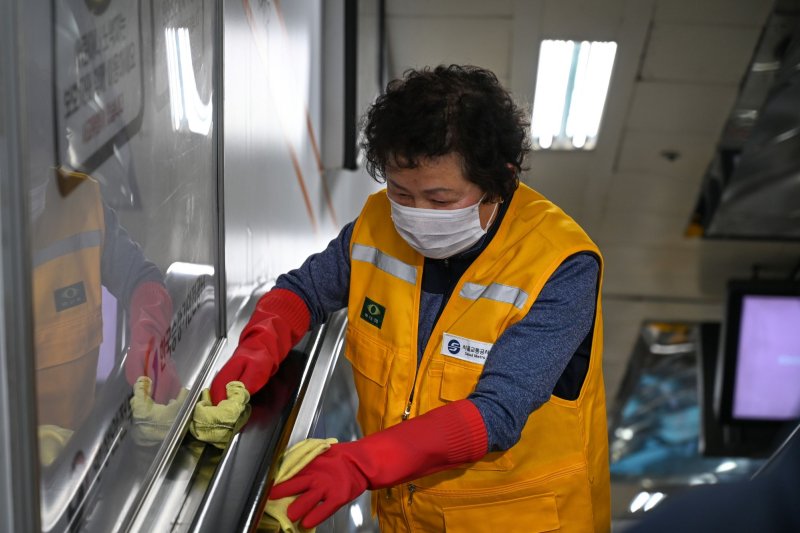
A worker cleans inside the Myeongdond subway station to protect against the coronavirus in Seoul on March 4. Photo by Thomas Maresca/UPI | License Photo
March 11 (UPI) -- According to new research, the novel coronavirus can remain in the air for up to 3 hours and survive on some surfaces for two to three days.
The research, which was carried out by scientists from the National Institutes of Health, Princeton University and UCLA, suggests it's possible for the virus to spread through the air as well as through the touching of contaminated surfaces
"Our results indicate that aerosol and fomite transmission of HCoV-19 is plausible, as the virus can remain viable in aerosols for multiple hours and on surfaces up to days," researchers wrote in the study's abstract.
The research was published on medRxiv, a site where health and medical science studies can be shared prior to peer review and acceptance into a scientific journal.
For the study, scientists used a nebulizer to spray the coronavirus into the air in a manner similar to a cough. The virus could be detected in the air up to 3 hours later. Researchers also placed samples on a variety of surfaces. They found the virus could survive for up to 4 hours on copper, as many as 24 hours on cardboard, and two to three days on plastic and stainless steel.
Tests showed the genetically related virus responsible for the 2003 SARS outbreak is similarly durable, so the ability of the new coronavirus to survive in the air and on surfaces doesn't explain its ability to spread more rapidly.
"Overall, stability is very similar between HCoV-19 and SARS-CoV-1," researchers wrote.
The study is one of the first to look specifically at how long the new coronavirus can live in the air and on surfaces, but it doesn't prove how exactly COVID-19 is spreading.
"We don't know if you can pick up COVID-19 from contaminated surfaces or inanimate objects at this point. That's the bottom line," Marilyn Roberts, a microbiologist at the University of Washington School of Public Health, told the MIT Technology Review.
The new coronavirus can be killed using a range of disinfectants, including rubbing alcohol and diluted hydrogen peroxide. The Environmental Protection Agency has a complete list of the commercially available cleaning products that can kill the virus.
An earlier survey of the available scientific literature on the complete family of coronaviruses -- SARS coronavirus, the Middle East Respiratory Syndrome coronavirus and endemic human coronaviruses -- showed some of the viruses can can persist on inanimate surfaces such as metal, glass and plastic for up to nine days.
Tests showed the genetically related virus responsible for the 2003 SARS outbreak is similarly durable, so the ability of the new coronavirus to survive in the air and on surfaces doesn't explain its ability to spread more rapidly.
"Overall, stability is very similar between HCoV-19 and SARS-CoV-1," researchers wrote.
The study is one of the first to look specifically at how long the new coronavirus can live in the air and on surfaces, but it doesn't prove how exactly COVID-19 is spreading.
"We don't know if you can pick up COVID-19 from contaminated surfaces or inanimate objects at this point. That's the bottom line," Marilyn Roberts, a microbiologist at the University of Washington School of Public Health, told the MIT Technology Review.
The new coronavirus can be killed using a range of disinfectants, including rubbing alcohol and diluted hydrogen peroxide. The Environmental Protection Agency has a complete list of the commercially available cleaning products that can kill the virus.
An earlier survey of the available scientific literature on the complete family of coronaviruses -- SARS coronavirus, the Middle East Respiratory Syndrome coronavirus and endemic human coronaviruses -- showed some of the viruses can can persist on inanimate surfaces such as metal, glass and plastic for up to nine days.
No comments:
Post a Comment